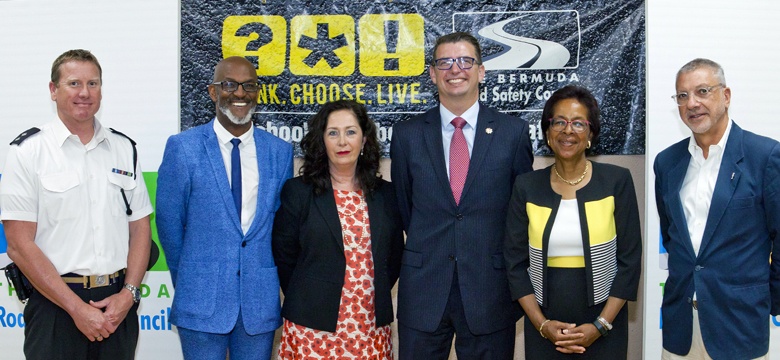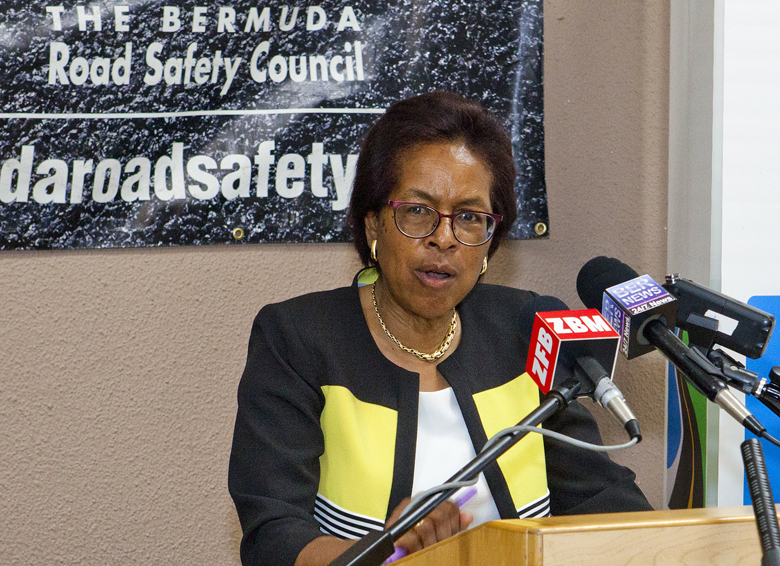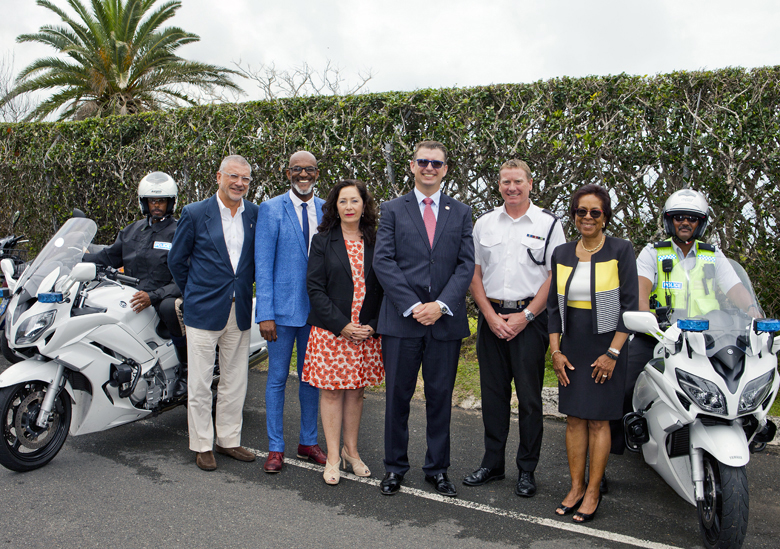
Press Statement by the Minister of Tourism, Transport & Municipalities, Senator, the Hon. M. Michael Fahy, JP.
I would like to welcome my colleague, the Minister of Health and Seniors, the Hon. Jeanne Atherden JP MP; recognise Inspector Robert Cardwell of the Bermuda Police Service; and introduce the new Chair of the Bermuda Road Safety Council Ali Bardgett.
We are here as the Road Safety Council acknowledges the United Nations’ World Health Organisation initiation of Global Road Safety Week for all OECD countries.
The initiative observes that driving-related loss of life is among the most preventable of all premature deaths in our society. In Bermuda, because we have such a small population, road deaths and serious injuries impact a large portion of the community.
We all know of someone, or family and friends of someone, who has been lost to the roads. So the human strife as a result of a fatality, or even a serious injury accident, is proportionately high in our island.
The advocacy for Road Safety is not new, yet over a 10-year period to 2016, we lost 127 people to road traffic deaths – 93 percent of whom are males.
Police statistics tell us that much of this is as a result of behaviour we can change – impaired driving and speeding. The Government has already signaled an intention to explore roadside testing this year. We are working with the Ministry of National Security, the Bermuda Road Safety Council and CADA to further discourage impaired driving. Ministry efforts to improve road safety will also include the introduction of speed cameras at various locations around the Island.
Further, the Road Safety Council and the Ministry are diligently working on producing a draft bill in respect of graduating licensing to change behaviors.
This is the month of May, yet we still have an exciting year ahead of us with increased tourism, the start of developments for a new airport terminal and new hotel building bringing jobs and entrepreneurial opportunities.
This, together with the excitement of The America’s Cup, means there will be a vibrancy this summer to the Bermuda mosaic, not seen in many years, if ever at all.
We all should be able to enjoy this, but with 1300 people visiting the emergency room a year for road traffic accidents, we will have to make drastic changes in our attitudes to motoring, to improve our odds.
Parents of new road users are invited to visit the Bermuda Road Safety Council website (http://www.bermudaroadsafety.bm/) and share with their children a variety of information that could save their lives, or the lives of others. This information is not just for new drivers, by the way.
We all could use a refresher, from time to time, on how to stay safe on Bermuda’s roads.
Road safety is a community issue and we all have a part to play.
I would like to invite my colleague, the Minister for Health and Seniors to say a few words on this from her Ministry’s perspective.

Press Statement by the Minister of Health and Seniors, The Hon. Jeanne Atherden, CA, CPA, JP, MP
Let me get straight to the point. Road traffic deaths and injuries in Bermuda constitute a serious public health problem.
Statistically speaking, a male on a motorbike is the most likely combination of gender and mode of transportation that leads to sudden death. Indeed, Bermuda has the 3rd highest rate of road traffic deaths compared to the OECD, while women have the 3rd lowest.
Of those killed in transport accidents in the years 2010 - 2014, which include motorcycles riders, pedestrians, pedal cyclists, car occupants and boat occupants, 79% were motorbike riders.
The most common external cause of death—and by that I mean death that is not due to disease or illness—for males between the years 2010 and 2014 was a transport accident. In fact, 43% of male deaths not due to illness or disease were from road traffic accidents.
You don’t need to be a statistician to get this. Tragically, news reports have a familiar phrase: a male riding a motorcycle has died of his injuries…name withheld pending notification of the victim’s family. It’s a report we hear too often.
I understand that vehicles are necessary for economic prosperity and social development but they can do serious harm to human health unless safety is a priority.
The Ministry of Health and Seniors has long supported increased road safety and supports the efforts of those who have primary responsibility to drive essential changes. The injuries caused by road traffic collisions can have a severe impact on a person’s life, and their consequences can range from temporary pain and inconvenience, to disability and chronic pain, or death.
Globally, studies indicate that typically 40-50% of drivers go over posted speed limits. Drivers who are male, young and under the influence of alcohol are more likely to be involved in speed-related crashes. Road traffic crashes remain the number one cause of death among young people aged 15–29 years. They are estimated to cost countries from 3-5% of GDP and push many families into poverty.
Global Road Safety Week being held this week 8-14 May 2017 focuses on speed and what can be done to address this key risk factor for road traffic deaths and injuries. Globally, speed contributes to around one-third of all fatal road traffic crashes in high-income countries, and up to half in low- and middle-income countries. For every 1km/hr increase in speed there is a 3% increase in the incidence of injury crashes and a 5% increase in the risk of a fatal crash.
I believe that health is an aspect of almost every human effort. I like what WHO Director-General Dr Margaret Chan says: “Speed is at the core of the global road traffic injury problem. If countries were to address just this key risk, they would soon reap the rewards of safer roads, both in terms of lives saved and increases in walking and cycling, with profound and lasting effects on health.”
We are standing here together today so that everyone understands that we are all serious about reducing road traffic fatalities and injuries.
The Ministry of Health and Seniors believes that using our roads safely is vital to the health of our population. This week is ‘slow down week’. Only you can control your speed, so for the sake of your loved ones, please slow down.

Press Statement by the BRSC Chair, Ali Bardgett
Good afternoon and on behalf of the BRSC, thank you for joining us here today at the start of the Global Road Safety Week in collaboration with the UN and WHO.
Bermuda joins hundreds of other countries holding events around the world this week such as:
- Slow Down Days
- Campaigns in schools
- Activities involving parliamentarians
- Symposiums
and sadly, the many Vigils for road traffic victims and their families.
Here at home, The ‘Piece of The Rock campaign is in full swing and social media is being used to the fullest extent to reach our youth.
Bermuda is a consistently in the top three countries for road fatalities and serious injuries due to road traffic collisions. It has been this way for decades and the time for change is long overdue.
It is important to recognize the different agencies and ministries here today, and to know that we are all working together collaboratively to improve Road Safety.
Since my appointment in January as Chair of the BRSC, my main focus has been to ensure that the decision makers have the information they need in areas where we need legislative changes, and that we work collaboratively to ensure these changes continue to move forward. In addition, that communication between us all is open and effective, and that we are working together rather than duplicating effort by working in silos.
The responsibility for making our roads safe does not lie exclusively with our Government or the Police. It is on all of us. Be responsible, pay attention, be courteous (use your Indicators!), be the designated driver and above all – SLOW DOWN and SAVE LIVES.
